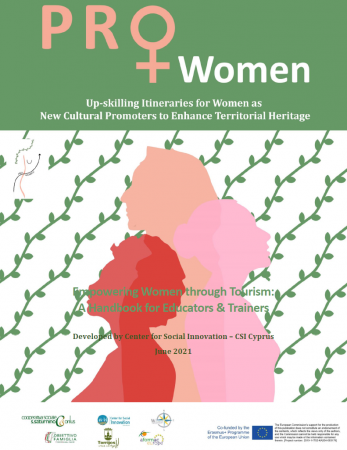Pro-Women. Up-skilling Itineraries for Women as New Cultural Promoters to Enhance Territorial Heritage

“ProWomen – Up-skilling Itineraries for Women as New Cultural Promoters to Enhance Territorial Heritage is an Erasmus+ KA2 project that runs from September 2019 to August 2021.
The Pro-Women project wants to promote equal opportunities and social-labour inclusion of the low-skilled and unemployed women by providing intervention tools for training and empowerment. The target group will undertake a participative learning path to strengthen their competences and acquire new ones, with the final aim of supporting their employability in the Tourism sector. The project challenge is to operate in sustainable tourism. Therefore, this sector must increasingly be approached with a view of enhancing the cultural and environmental heritage, namely the legacy which includes tangible and intangible culture, as well as natural heritage (landscapes, biodiversity, etc.).” (About)
“This Handbook is developed with the aim of helping professionals (educators, trainers) working with women in a vulnerable situation to develop learning activities and make their up-skilling and to promote their employability in the tourism sector.
The Handbook provides suggestions on how to work with vulnerable women, while emphasizing at the same time the individuality of each person. It also contains information on how to effectively communicate, listen and engage, observe, promote and enable, mobilise resources, assess and plan. The Handbook will refer to the previous products and activities developed in the context of the Pro-Women project, such as IO1 – An Integrated Reading of the Territories, IO2 – Learning Course Package, and IO3 – Atlas. In this way, it becomes a holistic reference point of the project objectives as a whole, while simultaneously utilizing all the resources that have been developed within the project duration.
One innovative element of this Output is that it offers tools and exercises that help identify the specific challenges of each woman in a vulnerable position and thus to assess their actual needs in order to adapt the intervention paths and perspectives to the real needs of the individual. This is reflected in the belief that women do not comprise a homogeneous group or category; they face different challenges and thus it is crucial to try and understand their situation and their specific needs in order to formulate appropriate plans of action. These tools will be in the form of outlines for interviews and questionnaires.” (Handbook)
